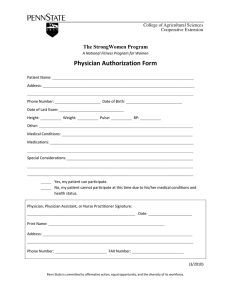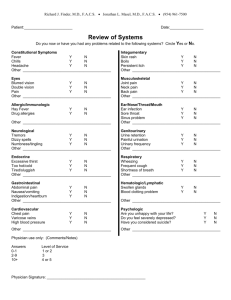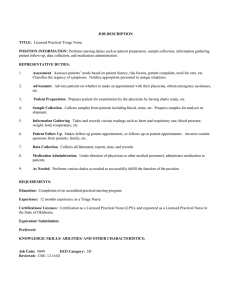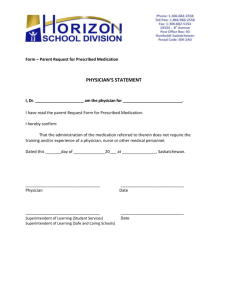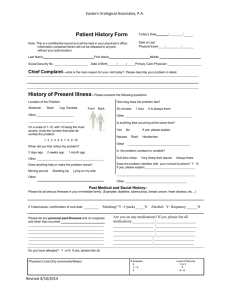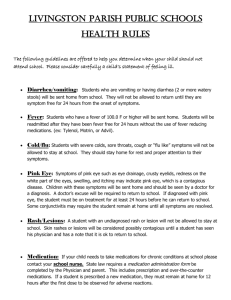SCHOOL HEALTH HANDBOOK - Barrington Public Schools
advertisement
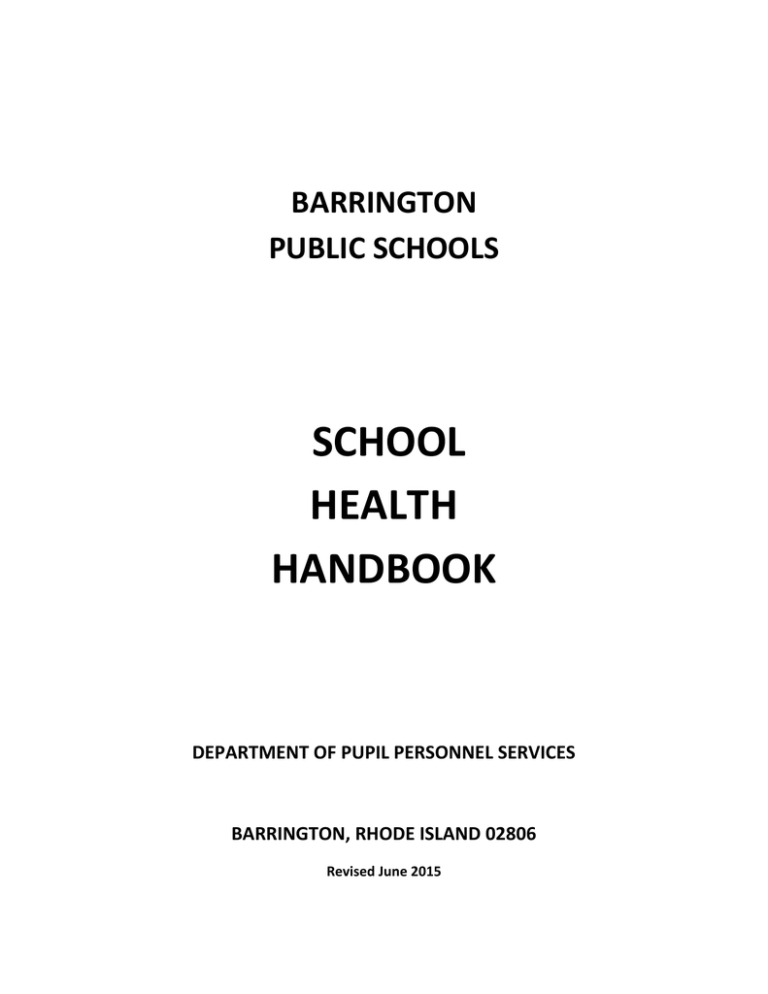
BARRINGTON PUBLIC SCHOOLS SCHOOL HEALTH HANDBOOK DEPARTMENT OF PUPIL PERSONNEL SERVICES BARRINGTON, RHODE ISLAND 02806 Revised June 2015 BARRINGTON PUBLIC SCHOOLS 283 County Road Barrington, Rhode Island 02806 247-3145 The Barrington School Department employs six certified school nurse teachers, one consulting physician, and one consulting dentist. Their primary responsibility is to ensure a healthy and safe environment for all students and staff. The contents of this handbook have been prepared under their guidance to assist you in understanding school health protocols regarding the prevention and control of communicable diseases, as well as managing common health issues in the school setting. Should you have any questions of a health nature concerning your child, feel free to call the school nurse for guidance. Remember, they are not replacing your family physician, but rather are available to you as a resource for direction involving medical issues affecting your child. Please read the contents of this handbook carefully. The primary purpose is to give you information about the most common health problems children encounter by nature of being in group settings. We hope you will find it helpful. This handbook, as well as Health Services documents and links can be found online at, www.barringtonschools.org/healthservices IMMUNIZATIONS AND PHYSICAL EXAMINATION In accordance with the Rhode Island Department of Health Rules and Regulations pertaining to Immunization and Testing for Communicable Diseases [R23-1-IMM], all children entering school are required to have up to date immunizations. A physician’s certificate or school health record, with actual dates of immunization, is the only acceptable documents of identification. YOUR CHILD MAY NOT ENTER SCHOOL WITHOUT THIS INFORMATION. Students may be exempt from the immunization requirement if: a) a licensed physician signs a medical exemption stating that such a student is exempt from a specific vaccine because of a medical reason; or b) a parent or guardian completes and signs the Immunization Exemption Form, available from the Office of Disease Control, Rhode Island Department of Health on the grounds of religious beliefs. All children entering Kindergarten, grade 7, grade 12, and all newly enrolled and out-of-state transfer students must show evidence of a physical examination. This examination shall be conducted in the twelve (12) months preceding the date of school entry, but if not, it shall be completed within six (6) months of school entry. A health history is also required for all new students. During the middle and high school years, students who participate in sports activities are required to have an annual physical examination. All children entering kindergarten are required by state law to have a vision screening done by their primary care provider before the start of the school year. The RI Department of Health lead screening entry requirement for schools, requires documentation from the child’s healthcare provider that the “student is in compliance with lead screening” for Pre-K and kindergarten entry. IT IS THE RESPONSIBILITY OF THE PARENT TO NOTIFY THE SCHOOL NURSE OF ANY CHANGES IN THEIR CHILD’S HEALTH STATUS, ESPECIALLY ALLERGIC REACTIONS, MEDICATION, ASTHMA, ETC. Specific immunization requirements for all grades and the RI School Physical Form can be found on Barrington Public Schools District Health Services webpage, which is provided on page one of this handbook. Applicable forms are located on the right side of the page and can be downloaded. PROTOCOLS Medications: School health protocol requires special permission for use of any medications by students. If your child has over the counter or prescription medication, arrangements must be made with the school nurse for dispensing, generally given midday. You and your child’s physician will be required to sign a consent form. The school nurse will make arrangements with the student regarding the time he/she is to come to the office. This medication will be supplied and transported by parents in the original properly labeled container. At the secondary levels, a student may deliver his/her own medication to school at the parent’s/school nurse’s discretion. Rhode Island Rules and Regulations for School Health Programs [R16-21-SCHO] permit students to selfcarry and self-administer a day’s supply of medication during an off-site school sponsored activity (e.g. field trip). This medication must be properly supplied by the parent. If age appropriate and medically indicated, students with medications such as rescue inhalers and EpiPens may self-carry with written permission from both the doctor and parent/guardian. The school nurse must be notified by the parent, so the appropriate school personnel can be made aware that the student will carry these medications on their person during school hours. At the Middle School and High School level, Ibuprofen, Acetaminophen and Gelusil (antacid) can be administered by the school nurse with written parent permission. Teachers do not supervise or administer medications (this includes over the counter medications). Occasionally, students are treated with medication at home. It is important for the nurse to be notified so that appropriate personnel can be made aware in case of untoward reactions during the school day. Mobility Problems: If your child has incurred problems of a medical nature regarding mobility, call your building principal/nurse. In most cases, the School Department can make temporary arrangements which will allow your child to participate in his/her classroom activities. Excuse from Participation in School Activities: If your child must be excluded from activities, such as physical education classes, for more than 3 days, a written excuse from your physician stating the diagnosis and dates of exclusion is necessary. If the date to resume activity is not specified in the original excuse, a follow-up release when to resume activity is required from the physician. Concussions: Barrington schools recognize the importance of identifying students who have suffered a concussion. Implementation of physical and cognitive rest surrounding school activities is vital to the student’s recovery. If your child has been diagnosed with a concussion, please contact your child’s school administrator and school nurse for assistance. Accommodations will be put in place per physician’s orders. Food Allergies: Barrington schools are committed to the safety and health of all students with food allergies. We abide by the Rhode Island Rules and Regulations for School Health Programs that pertain to food allergies. It is the parent’s responsibility to notify the school for severe food allergies so we can work with you and your child’s physician to create an Emergency Health Care Plan and Individual Health Care Plan if indicated, for your child. Student Screenings: The School Department will conduct hearing, vision, and dental screenings. Students in 6th, 7th & 8th grades will be screened for scoliosis. Screening, by its very nature, is a relatively quick process and will only identify problems that are obvious. It does not replace parental responsibility to monitor the child’s development in conjunction with the family dentist and pediatrician. There will be notification regarding all screenings. If for some reason you choose not to have your child participate, please give written notification to the school nurse. CONTAGIOUS CONDITIONS Chicken Pox/Shingles: Students will be excluded from school until all vesicles and scabs are dry. This usually takes about one week from the onset of rash. Cold/Cough Symptoms: If your child is experiencing discomfort that would interfere with his/her school performance please keep him/her home until they are able to resume normal activity. If there is a prolonged cough with or without a fever consult his/her physician. Conjunctivitis (Pink-Eye): This condition is easily spread by direct contact with discharge from the infected eye(s). Students will be excluded when eyes are inflamed and draining. Prescribed treatment is normally antibiotics. Your physician will tell you when it is appropriate for your child to return to school. Fever: If your child’s temperature is 100 degrees or higher it is recommended he/she should remain at home until fever free for 24 hours, without fever reducing medication. Head Lice (Pediculosis): Outbreaks are possible wherever children gather. Students diagnosed with live head lice do not need to be sent home early from school; they can go home at the end of the day, be treated, and return to class after appropriate treatment has begun. Your child will be checked by the school nurse prior to readmission. Impetigo: This is a common skin infection caused by bacteria. Lesions (sores) appear primarily around the nose and mouth but may present elsewhere on the body. Students may return after 24 hours of antibiotic treatment and lesions are dry. Rashes: A suspicious skin rash with or without a fever, should be evaluated by your child’s doctor. Sore Throat/Strep Throat: A sore throat in conjunction with swollen glands may indicate strep throat. A fever is not always present with strep throat. Other symptoms may include a headache and/or upset stomach. A minor sore throat is fairly common, but a child with strep throat needs medical attention and may return to school after 24 hours of antibiotic therapy. Vomiting/Diarrhea: A child with vomiting and /or diarrhea should be kept at home until symptoms have subsided, and the child is able to keep down food and liquid.
